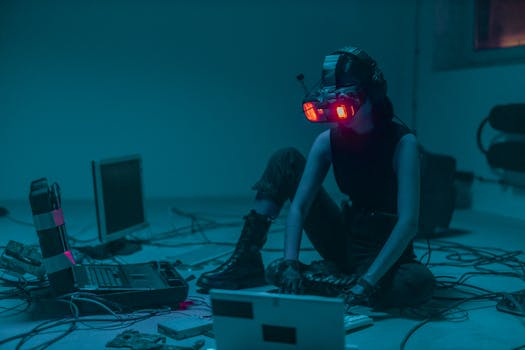Neurotech: Interfacing Brains and Computers
Neurotech is a rapidly growing field that combines neurobiology, computer science, and engineering to explore the potential of interfacing brains and computers. It involves the development of cutting-edge technologies that can directly connect the human brain with computers, opening up a whole new world of possibilities for understanding and enhancing the brain’s capabilities. As we continue to make strides in this area, the potential impacts on both the medical and technological fields are immense.
The Intriguing World of Neurotech
At its core, neurotech is the science and technology of recording, decoding, and manipulating neural signals in real-time. It essentially allows for direct communication between the brain and an external device, such as a computer or robotic arm. This can be achieved through various methods, including implanting electrodes or sensors in the brain, using non-invasive brain-computer interfaces, or even utilizing virtual and augmented reality tools to interact with neural data.
Advancements in Neuroprosthetics
One of the most significant impacts of neurotech has been in the development of neuroprosthetics – devices that can restore or enhance lost or damaged neurological functions. For individuals with spinal cord injuries or neurodegenerative diseases, this technology can be life-changing. By connecting to a person’s brain signals, neuroprosthetics can bypass damaged areas of the nervous system and allow for movements and sensations to be controlled by thought alone.
Revolutionizing Healthcare
The potential of neurotech in the medical field is vast. It allows for the monitoring and treatment of brain-related disorders in real-time, providing invaluable insights into brain function and behavior. This has significant implications for conditions such as epilepsy, Parkinson’s disease, and Alzheimer’s disease, where timely intervention can greatly improve outcomes. Additionally, neurotech is also being used in the development of personalized medicine, as it can analyze individual brain patterns to determine the most effective treatment plan for a specific patient.
Empowering Human-Computer Interaction
Neurotech also holds great promise in revolutionizing human-computer interaction. With direct brain-computer interfaces, individuals can control devices, computers, and even virtual avatars using their thoughts. This technology has immense potential for individuals with severe disabilities, allowing them to communicate and interact with the world in ways that were previously impossible. In the future, we may see a world where our thoughts become our primary mode of interaction with technology, opening up a whole new level of convenience and efficiency.
The Future of Neurotech
The possibilities of neurotech are endless, and we are only scratching the surface of what is possible. As we continue to advance our understanding of the brain and its neural networks, we can expect even more groundbreaking developments in this field. From enhancing cognitive abilities and memory to developing brain-controlled virtual reality experiences, the potential applications of neurotech are vast and exciting.
Challenges Ahead
As with any emerging technology, there are undoubtedly challenges that need to be addressed in the field of neurotech. One of the main concerns is the ethical implications of directly interfacing with the brain, including issues of privacy, informed consent, and potential misuse of this technology. There are also technical challenges such as developing reliable and safe methods of connecting the brain to external devices and reducing the risk of infections or other complications.
The Role of Google and SEO
As the field of neurotech continues to expand, it is essential to have accurate and easily accessible information for both professionals and the general public. This is where the role of Google and SEO comes into play. By optimizing content for search engines, we can ensure that accurate and up-to-date information about neurotech is readily available to anyone looking to learn more about this exciting field.
In conclusion, neurotech has opened up a world of possibilities for interfacing brains and computers, with potential applications in various industries, from healthcare to gaming and beyond. As we continue to explore and refine this technology, the impact on society will only continue to grow. It is an exciting time for neurotech, and the future holds limitless potential for advancements in this field.







